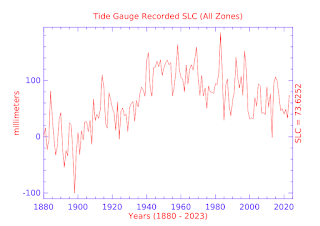 |
| Fig. 1 Coastal Revelations |
The coastal area we are focusing on today is shown in Fig. 1.
It is called the "Coastal N. Pacific" in the WOD manual (Appendix 11.1).
Notice that the Coastal N. Pacific area contains nine WOD Zones (7311, 7312, 7412, 7512, 7513, 7514, 7515, 7614, and 7615).
That area gives us a very fruitful place where we can study the radically conflicting data concerning thermal expansion and contraction estimated sea level change compared with the actual measurements of sea level change.
 |
| Fig. 2 GISS Surface Anomaly |
I generated some graphs using the WOD manual's maximum-minimum seawater temperatures and salinity so that you can see the maximum, median, and minimum thermal expansion and contraction calculations for 33 depth levels (APNDX Max, APNDX Med, APNDX Min).
Since those manual max/med/min values are painfully redundant they were mitigated by the GISS ocean surface anomaly shown in Fig. 2; and for grins I have included HTML tables showing the calculation dynamics that detail the nuts and bolts of calculating thermal expansion and contraction in several large ocean areas (APNDX Many Oceans).
 |
| Fig. 3 Tide gauge in situ Reality |
Also I have included a graph for the actual sea level change recorded at the surface by tide gauge stations in those same nine Coastal N. Pacific area WOD Zones (Fig. 3).
So, in case you are wondering what "surprising answers to perplexing
questions" are involved in this study of the Coastal N. Pacific area,
let me elaborate a bit.
Notice that the actual sea change in those nine WOD zones does not have the same pattern as the GISS surface anomaly or the thermal expansion and contraction patterns.
That is because sea level is falling in the nine Coastal N. Pacific area WOD Zones featured in today's post.
This "surprising answers to perplexing questions" syndrome has been pointed out here on Dredd Blog for years (see e.g. Proof of Concept, 2, 3, 4, 5, 6, 7, 8, 9, 10; The Evolution and Migration of Sea Level Hinge Points, 2).
The previous post in this series is here.
Lyrics: Things Have Changed
No comments:
Post a Comment